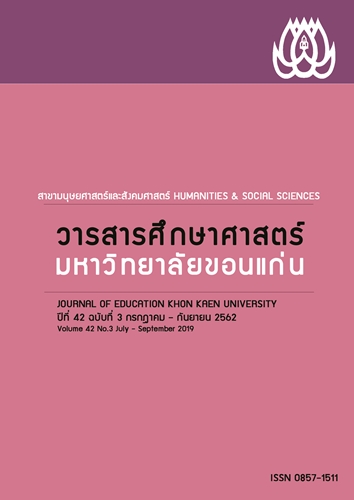CO-TPACK: ENHANCING COOPERATION AMONG SCIENCE TEACHERS THROUGH TECHNOLOGICAL PEDAGOGICAL CONTENT KNOWLEDGE
Main Article Content
บทคัดย่อ
An emerging body of “21st century skills,” such as adaptability, complex communication skills, technological skills, and the ability to solve non-routine problems, are valuable across a wide range of jobs in the national economy. Thai science education has advocated infusing 21st century skills into the school curriculum, and several educational levels have launched such efforts. However, developing proper knowledge among science teachers will be the most important factor in achieving goals related to these endeavors. The purposes of this study were to enhance 40 cooperating science teachers’ and 48 pre-service science teachers’ Technological Pedagogical Content Knowledge (TPACK) and to develop a Professional Development Model integrated with a Co-Teaching Model and Coaching System. Forty volunteer in-service teachers, or cooperating science teachers, participated in this study for 2 years. Data sources throughout the research project consisted of teacher reflections, classroom observations, semi-structured interviews, situational interviews, questionnaires, and document analysis. An interpretivist framework was used to analyze the data. Findings indicate that teachers did not initially know how to integrate the technology into their science classrooms. Mostly, they preferred using lecture-based teaching and experimental teaching styles. Co-TPACK consists of 3 cycles (Student Teachers’ Preparation Cycle, Cooperating Science Teachers Cycle, and Collaboration Cycle (Co-teaching, Co-planning, and Co-Evaluating and Coaching System). Co-TPACK promoted an exchange of knowledge and experience related to science teaching among cooperating science teachers, student teachers, and university supervisors. Participants in the study used many channels for communication, including online forums. Over time, they used more technology-integrated teaching and learning. Their continuous development is evident in their lesson plans and teaching practices.
Article Details
เอกสารอ้างอิง
Beetham, H., and Sharpe, R. (2013). Rethinking Pedagogy for a Digital Age: Designing for 21st Century Learning. New York: Routledge.
Charmaz, K. (2003). Grounded theory. In: J. A. Smith Qualitative Psychology: A Practical Guide to Research Methods. London: Sage.
Chatmaneerungcharoen, S. et al. (2008). The Elementary Science Teachers’ Pedagogical Content Knowledge and Practices of Schools under the Bangkok Metropolitan Administration. KKU Research Journal, 14(12), 1132-1142.
Healy, C. C., & Welchert, A. J. (1990). Mentoring relations: A definition to advance research and practice. Educational Researcher, 19(9), 17–21.
International Society for Technology in Education. (2000a). National Educational Technology Standards for Teachers. International Society for Technology in Education (ISTE). Retrieved January 24, 2017, from http://www.iste.org
International Society for Technology in Education. (2000b). National Educational Technology Standards for Students: Connecting Curriculum and Technology. Eugene, OR: Author.
Koehler, M., and Mishra, P. (2006). Technological Pedagogical Content Knowledge: A new framework for teacher knowledge. Teachers College Record, 108(6), 1017-1054.
Koehler, M., & Mishra, P. (2009). What is technological pedagogical content knowledge (TPACK)?. Contemporary Issues in Technology and Teacher Education, 9(1), 0-70.
National Research Council. (1996). The National Science Education Standards. Washington, DC: Brooking Institution.
Niess, M. L. (2007). Mathematics Teachers Developing Technological Pedagogical Content Knowledge (TPCK). Paper presented at IMICT 2007, Boston, MA.
Office of the Education Council (OEC). (2004). Education in Thailand 2004. Bangkok: Amarin Printing.
Office of the National Education Commission (ONEC). (2001). The Research Report for Comparing of Educational Reform to Know in Thai Science Education Reform. Bangkok: ONEC.
Office of the Rajabhat Institutes Council. (2002). Quarterly Report on World Bank project -The Secondary Education Quality Improvement Project. IBRD Loan 4052 TH. Bangkok: Author.
Shulman, L. (1986). Those who understand: Knowledge Growth in Teaching. Educational Researcher, 15(2), 4–14.
Tanruther, E. M. (1994). What does it mean to be a supervisory teacher? College Journal, 1, 167-171.
Thibeault, J. (2004). The Relationship Between Student Teachers and Cooperating Teachers as a Foundation for the Development of Reflective Thinking: An Exploratory Study Based on Student Teachers’ Perceptions. Unpublished doctoral dissertation. McGill University, Montreal, Canada.
Yutakom, N., & Chero, P. (1999). Reporting of In-service Science Teacher Professional Development in Accordance with the National Education Act of B.E. 2542. Bangkok: IPST.
Walkington, J. (2005). Becoming a teacher: encouraging development of teacher identity through reflective practice. Asia-Pacific Journal of Teacher Education, 33(1), 53-64.
Williams, C. C. (2001). Student Teacher Perceptions of University Supervisor Performance. Unpublished dissertation, Tennessee State University.


